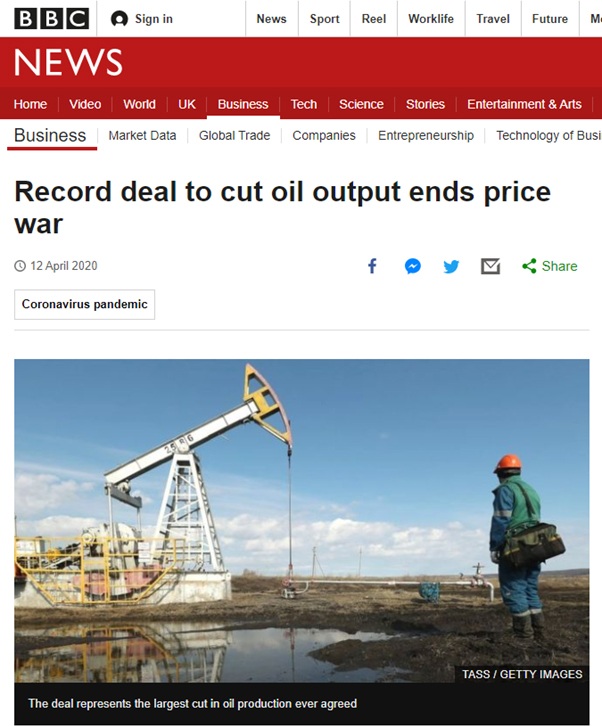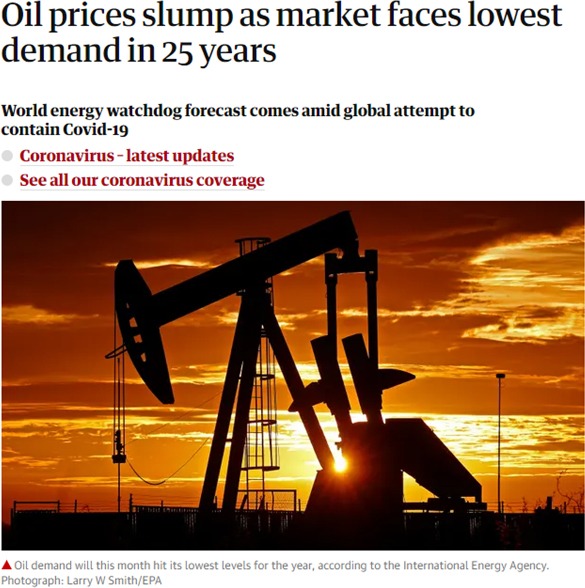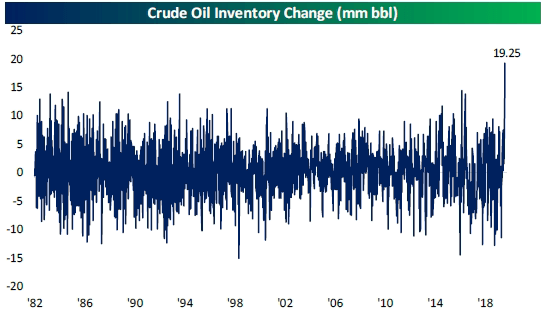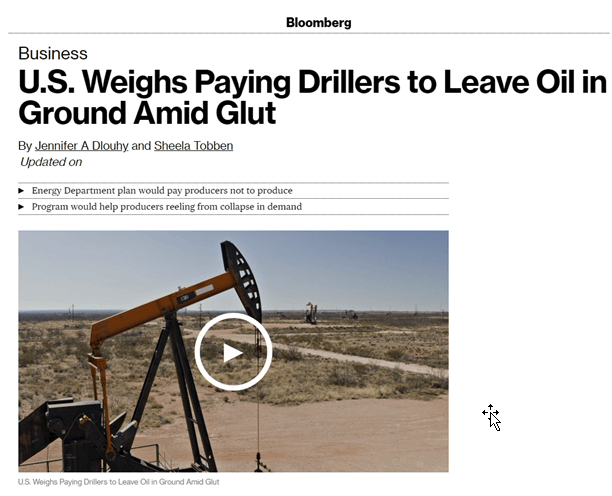Hello again and welcome back everyone. In the last couple videos and articles,I went into details about the current situation in specific markets like the oil market where the OPEC plus now finally came to a record agreement
and is cutting the oil production by 9.7 million, almost 10 million barrels per single day in an attempt to re-stabilize the oil price, and did it work? Well not so much ...yet? The International Energy Agency reported the global oil demand at its lowest in 25 years.
While Crude Oil Inventories reached record levels.
The US government appears to be so worried about their domestic oil industry to not cause an avalanche of credit issues that it is in fact considering to pay oil companies to NOT drill oil.
Crazy world, so many things seem upside down these days, don’t they?
But I guess the Oil bulls will need to be more patient for sure.
In my last video I also spoke about the U.S. stock markets, and if you have seen any of my videos you would have noticed that there is pretty much always a large number of different factors that influence markets.
In this video today however, I do not want to talk about any market. No - we are not going to do that today. Sorry.
Instead I want to take a closer look at something that when it comes to trading for sure is of key importance and can in fact make all the difference between winning or losing.
I am talking about brokers or brokerages and in particular Forex and CFD brokers. Yes those lovely companies that enable us, you and me to access the financial markets to begin with and to trade.
Since as traders we have to send our money to the broker and are very much reliant on the broker’s reliability and the quality of the service this is an evergreen topic of epic importance.
And Just like there are many different news or rumours surrounding any particular market or asset, and some of those may be accurate, while others would be complete fabrication and simply not true, there are also a lot of preconceptions when it comes to Forex and CFD brokers…and I want to have a look at a couple of those preconceptions and give you my personal view on them.
Let me start off by saying that within the last 12 years I have had trading accounts with brokers from all over the world, from Australia, New Zealand, Dubai, Cyprus, Switzerland, Luxemburg, Germany, Gibraltar, Ireland, the US and of course also in the UK. And then there are also brokers on my list from places like Mauritius, Panama, Seychelles, Vanuatu or Saint Vincent’s and the Grenadines.
No, I am talking about vacation destinations here, I wouldn’t do that, especially now where absolutely nobody could be possibly longing for some sun, and the sea and to relax for a moment and just enjoy a mojito - ahh sorry I got carried away here for a moment
So, as you can see this industry literally exists all over the world and I have been right in the middle of it from virtually every possible angle, because I have both worked for brokers and have been a client of brokers as trader for over 12 years now.
Today we want to have a look at the biggest preconceptions about Forex and CFD brokers.
1. unregulated brokers are all bad and only regulated brokers are good.
I definitely agree with that regulation is very relevant, as it forces brokers to have a higher level of sophistication and reporting to their regulator and typically brokerages in strong regulated jurisdiction are also better capitalized.
For example, brokers from the UK or Europe in general and of course Australia are among the what we would call very reputable jurisdictions.
But you have to be careful here, because several FOREX and CFD brokerages operate multiple entities internationally under their same brand. So, they could have a UK based and Re FCA regulated brokerage brand but your trading account may effectively be with their Mauritius or Seychelles entity. And no offense to the Mauritius and Seychelles regulators here, but the rules are a lot less strict there and that also includes leverage. Offshore jurisdictions offer higher leverage usually, onshore have been restricting leverages more and more over the last years, Australia being the exception here so far, but and it looks like the Australian regulator also has even more strict leverage restrictions coming down the road sooner than later.
So, traders may in fact find themselves with the offshore entity of a brokerage brand just for getting higher leverage which I believe is not a smart move. First of all, you may not even realize that you are NOT with the strongly regulated entity any longer but with the offshore version of it now, which strips away quite a number of protections you would otherwise have. And that include a wide range of matter. For example, in case of a dispute with the Broker offshore disputes are typically not leading anywhere as there is little to no enforcement and the judicial system in that offshore country is typically a lot less strong and developed. So you better do not have a dispute while being Client of an offshore Broker. But it can affect also something completely else such as the requirements of how the broker must safekeep your deposited funds.
OK the chance that an international broker brand will do something “bad” in their offshore entity is granted small but if they wanted, they probably could...and as a beginner you simply do NOT need that high of a leverage - period, so why go offshore at all? I am just going to say it how it is. Leverage helps you to make more out of your capital but since that goes both ways, which means more profits but also more losses you should NEVER want to have high leverage before your trading is on point first and foremost.
But does it mean that “off-shore” located brokerages are all bad. No not necessarily. Why?
because there are cases for example where former employees of a big broker or traders that teamed up have set up their own brokerage in an offshore jurisdiction because it is easier, faster, has less requirements and is cheaper to operate and maintain. They will often be their own clients and in addition would already have a group of clients where trust was already built and the clients are happy with it.
Which brings me to the next point, which is trust. Because you always need to look at your broker on a case by case basis, even in the strong regulated jurisdictions.
At the end of the day you need to build a good relationship with the Broker that you eventually chose for your trading since you want to grow with that broker, so it is a mix of reasons that ultimately lead to your right choice.
2. Another preconception is that a good broker always only a-books which means sends every client order to the market for execution and never b-books, which means internalizing trades themselves or taking risk against its clients.
Look it is not that simple. I will tell you also why. We live in a world of say almost zero spread and low commission - do you understand how this is actually possible? It is because the conditions that exist these days in Forex and CFDs are to a big degree synthetic, they are made by the liquidity providers and do not necessarily mirror the cost that every trade would have if it was really executed with the market. Especially these days where there are millions of micro forex transactions, the cost of clearing each and every single ticket alone would possibly render the FX industry bankrupt. Also, because it would miss out on its biggest earnings which is yes, the clients’ losses and through risk taking against their clients to some extent.
But it’s all systemized. Virtually every Forex Broker has some sort of a hybrid model running. Think about it, the broker may have 10 thousand people trading, some are long others are short, so the broker really only has that net position as the “risk”.
The broker can choose to internalize some of it and when the risk gets too much for them they will chose to hedge their exposure with the liquidity provider that usually gets the trading flow from several brokerages and then combines all of that on his end, and will also chose to internalize some and hedge off other part of the total flow he is receiving and send to his prime broker. and that is an even more sophisticated dealing process.
But you should know that there is ALWAYS someone within the chain upwards that is internalizing the flow, so in a sense the MORE levels of confirmation your trade needs to go through before it can get executed the slower your execution will be and your slippage will probably increase too.
B-book on the other hand, executes faster, as it gets confirmed by the brokerage directly and doesn’t have to run through multiple more confirmations and that is why it usually has also less slippage. so b-book is not completely bad per se at all. It actually provides a certain level of liquidity quality that you can benefit from in your trading that otherwise could not be achieved because these market conditions wouldn’t exist.
One other thing though you should be aware of and again why stronger regulation does make big of a difference in my humble view. There have been cases of brokers going into bankruptcy because they did NOT hedge their client Flow and their b-book blew up in their face when clients made money, meaning trading profits on their trading accounts with the broker, but the broker couldn't pay the client profits because the broker never hedged on the market and the positive pnl never really happened on the market side and since the broker would now have to pay those client profits out of the own pocket now, the broker’s own money, they simply may not have that money to pay and go down in the process.
In stronger regulated jurisdictions client monies have to be kept completely separated from company funds so the chances for something like that to happen are a lot smaller, BUT they still exist. It means, you cannot rule out this risk to a full 100%. That said, and even if the FCA in the UK and the CySEC in Cyprus or the ASIC in Australia have had cases where client money vanished or were not there any longer and all of a sudden, and I could even bring up examples now, but OK maybe next time :-) the point being that possibility for that to happen to brokers in strong regulated jurisdictions is much smaller given the constant reporting requirements of brokers in strong regulated jurisdictions.
Can you see how point 1 and 2 tie together here, right? Again, why go offshore then?
Next is Point 3.
and I have heard it also so many times, that brokers by reputation are always on the lookout to try to scam their clients to profit themselves with numerous nefarious methods. Brokers are basically the “Dr. Evil” of the Forex world.
For example:
stop-hunting: well look first of all i don’t think that Forex and CFD brokers are watching your individual small position just to kick you out of the market, which is very difficult to say to the least. To move a market, they would likely need to trade huge positions on the market, so the cost and risk to “stop-hunting” easily outweighs any benefit really. is it technically possible that they do it? YES, it is, and it doesn’t even have to be “wrong pricing” but it could also be done with simple temporary spread widenings for example. But again, I think most people who talk about this have never even recorded their “stop-hunted” prices vs the quotes which means prices of other brokers at the same time.
If your broker hunts for stops, it would mean that the pricing or spreads of that broker need to differ in a large way in the very moment of the stop hunting from prices and spreads of other brokers who are NOT stop hunting, otherwise, if the price and spreads are more or less the same, keep in my it is an OTC market, not a local exchange, there is simply is no stop-hunting going on here.
Could Liquidity providers then at times move the market with big hedging orders to some extent? Yes, they could but they do not see the clients’ individual trades and stop levels anyway.
So sorry but this might be something that could have existed at some point in time, but it doesn’t exist too much today really BUT if you really want to be sure MEASURE your brokers pricing and spreads vs others to document it to confront the broker with it. Otherwise it’s just Fugazi talk and an excuse that often inexperienced traders like to believe and to use to find an explanation for their own trading losses.
slippage: a long-discussed topic and yes, this one is not a myth. If you execute aggressively for example with an algorithm automatically, brokers may consider you as what they call toxic or accuse you of trying to latency arbitrage them, which is against their T&C’s but that is a topic for another day, and yes they have defense mechanisms against that.
These defense mechanisms could be for example higher slippages, execution delays, rejections etc. etc. but this is only relevant to a small number of algorithmic traders and has absolutely NO relevance especially for anyone who is trading manually.
But again MEASURE, check your attempted trading price vs the execution price if you use a market order to record the real actual slippage on every trade. Another way to mitigate slippage risk, is to enter the market with pending orders like Stop and Limit orders to reduce or avoid slippages.
Number 4.
Another big fear I often hear is that brokers may choose to not pay you your profits or even your deposit back and while I have seen both, in onshore and offshore jurisdictions, it all comes down and back to your relationship with the brokerage. Because they will not strip your profits away for absolutely no reason, at least not from their perspective anyway, in some way they will have had issues with whatever it is that you are trading, and it doesn't matter whether they are right or not, because most T&Cs of all brokers include that they only need to have a suspicion on their end, which they do not even need to prove, and then they can in fact do that - yes bust your trades which means to delete your trading results and I mean delete your profits, they are not going to delete your losses, so don’t get your hopes up here.
One thing they will have to do in any case though is to return your deposit. The only time they will not return your deposit is when they go broke themselves, but again the matter of excessive slippage applies only to a very limited number of trading styles and it is better to not engage in a trading style that is considered abusive or toxic as it will save you a lot of trouble and also is just is not scalable.
so now that we have that we have some preconceptions out of the way, I hope you have a somewhat better overview about what's true and what is not.
I 100% agree with you that you need to have a reliable broker to succeed in your trading, BUT if you continuously lose in trading, then it is more than likely NOT the broker’s fault.
So please let’s be honestly speaking about BOTH sides of the coin.
Make sure that your trading is executed on your end 100% correctly first. AND YOU MUST TRACK EVERYTHING — Most people, me included often have subjective assumptions, a personal bias towards something, this could be happening consciously meaning you know about it, then you can try to consider it to balance it out, or and that's pretty bad subconsciously, meaning you don’t even know that you have that particular assumption or bias - it’s just a fancy way of saying you have no clue at all.
All of that hardly really matters still, because if you want to develop past subjective assumptions and rumors you need to track and measure.
If you think you are being exposed to stop hunting record the pricing and spread data of 5 other brokers and compare to confirm whether it is really your broker only that repeatedly hit your Stop Loss price while others did not.
Or if its slippage, measure your attempted execution price vs. the actual executed price, but you need to build some data here, you need to have at least 25-50 trades before you would review those stats.
When you use real measurable data then you can start to build trust with your broker and you will always know, not assume, because you are tracking and measuring, if something is indeed out of the ordinary and when you have a good relationship with your broker, you can actually approach the broker with your measurements and recorded data to address the issue. Think about it, Brokers get countless complaints every day, and probably most of them are driven by personal biases. People are just angry at themselves for losing and try to blame the broker for it. Now if you back your complaint with proof in form of recorded data, then they will have to look at your case in more detail and chances are there might be a solution indeed.
Also, If you want a better service from your broker then you might want to consider to invest more money. Most VIP accounts already start around a couple thousand bucks and some brokers even offer extremely low trading fees against a monthly subscription fee, so it is really counterproductive to complain at that level and instead you should solve your problem by just depositing more money or pay for the subscription to judge the service and quality of that broker at its top client level.
Another good way to vet brokers in my experience has been to talk to other traders WHO ARE LEGIT and successful, our peers basically, who have extensive experience with brokers and possibly have also worked with or at brokers before or have a personal relationship with the for example the CEO of the broker, and stuff like that.
In these kind of exchanges with other professionals you will quickly notice if a particular broker comes up with something let’s call it “fishy” or “shady” or not.
I still think we are not addressing the elephant in the trading room here. Could it be, but only maybe... that elements of your trading might be the reason why you are losing? Are you measuring and recording your own trading to being with? are you following a trading plan? do you have a trading plan at all? do you know what a trading plan is?
See it is always easy to get distracted by the wrong reasons, because it’s comfortable. and if we agree that the broker is always the bad guy then it’s never our own fault, right?
And trust me I had my fare share of issues with bad brokers over the years, very frustrating and costly experiences, so I am by no way defending them...just think about it for a moment please, what if instead, you were really on top of your own trading plan and fully aware and thus in charge of what is going on? backed up by accurately recorded and measured data? and I am not referring to broker spreads or slippage here alone, but also a trading journal for example? do you have one? and if not, how can you really know what is working and what is not working in your trading?
You see where I am going with this? Because if you ask me, the real question is: Do you want to have a chance at trading profitably? yes or no? because markets are brutally honest and that is what you need to be with yourself as well. and if you want to know the “truth” you need to accurately record and document your trading and follow a trading plan, otherwise you are just jerking around. sorry to be this blunt, but I can’t sugarcoat this for you and in fact really want to cut to the chase and tell you something of value here. This is what we do in our coaching’s as well, it makes absolutely zero sense to beat around the bush here.
So, if you want to learn what a trading plan looks like and how to improve your trading with a system, then feel free to contact us at EliteTraders because this among many other non-nonsense things is what we teach our students in our coaching.
Or if you prefer to start with something more simple check out our EliteTraders App giving you access to our team’s trading signals for forex, Stocks, Gold, Oil, and access to a great community really with weekly webinars and educational videos on top to enhance your trading experience.
If you enjoyed this video, please smash the like button like there is tomorrow and hit the subscription button too and that little bell also, so you get notified by YouTube whenever I upload a new video.
Please also leave a comment about your own experiences with brokers and I look forward to seeing you in the next video!
https://www.fxstreet.com/analysis/oil-market-update-and-the-truth-about-forex-cfd-brokers-video-202004220536
2020-04-22 05:36:00Z
CBMibGh0dHBzOi8vd3d3LmZ4c3RyZWV0LmNvbS9hbmFseXNpcy9vaWwtbWFya2V0LXVwZGF0ZS1hbmQtdGhlLXRydXRoLWFib3V0LWZvcmV4LWNmZC1icm9rZXJzLXZpZGVvLTIwMjAwNDIyMDUzNtIBcGh0dHBzOi8vd3d3LmZ4c3RyZWV0LmNvbS9hbXAvYW5hbHlzaXMvb2lsLW1hcmtldC11cGRhdGUtYW5kLXRoZS10cnV0aC1hYm91dC1mb3JleC1jZmQtYnJva2Vycy12aWRlby0yMDIwMDQyMjA1MzY
Bagikan Berita Ini


















0 Response to "Oil market update and the truth about Forex & CFD brokers [Video] - FXStreet"
Post a Comment